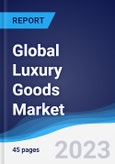Key Highlights
- The luxury goods market deals with high-end and premium products, which are not considered as essential or necessary for daily living but are rather associated with indulgence and exclusivity. The market value includes retail sales.
- The US captured the largest share of the global luxury goods market in 2022, accounting for a share of 25.9% in 2022, followed by China capturing a share of 17.8%.
- The global Luxury goods market had total revenues of $311.3 billion in 2022, representing a compound annual growth rate (CAGR) of 6.8% between 2017 and 2022.
- The bags & accessories segment accounted for the market's largest proportion in 2022, with total revenues of $90.5 billion, equivalent to 29.1% of the market's overall value.
Scope
- Save time carrying out entry-level research by identifying the size, growth, major segments, and leading players in the luxury goods market in the global
- Use the Five Forces analysis to determine the competitive intensity and therefore attractiveness of the global luxury goods market
- Leading company profiles reveal details of key luxury goods market players’ global operations and financial performance
- Add weight to presentations and pitches by understanding the future growth prospects of the Global luxury goods market with five year forecasts
Reasons to Buy
- What was the size of the Global luxury goods market by value in 2022?
- What will be the size of the Global luxury goods market in 2027?
- What factors are affecting the strength of competition in the Global luxury goods market?
- How has the market performed over the last five years?
- What are the main segments that make up the global's luxury goods market?
Table of Contents
Companies Mentioned (Partial List)
A selection of companies mentioned in this report includes, but is not limited to:
- LVMH Moet Hennessy Louis Vuitton SA
- Kering S.A.
- Chanel S.A.
- Compagnie Financiere Richemont SA








